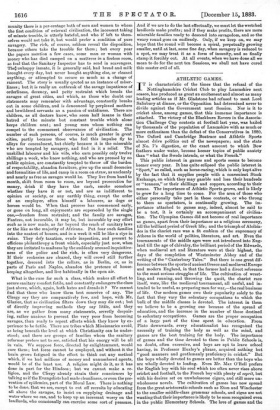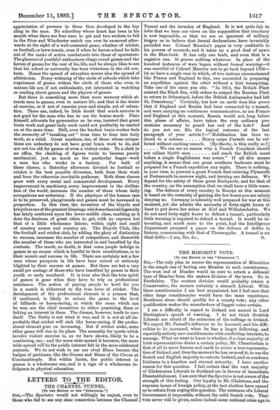ATHLETIC GAMES.
IT is characteristic of the times that the refusal of the Nottinghamshire Cricket Club to play Lancashire next season, has produced as great an excitement and almost as many leading articles as if Mr. Gladstone had refused to meet Lord Salisbury at dinner, or the Opposition had determined never to divide against the Government next Session. Nor is it to cricket alone, among games, that this immense importance is attached. The victory of the Blackburn Rovers in the Associa- tion Challenge Cup contests at football last year, was hailed by thousands of the population of Lancashire with as much or more enthusiasm than the defeat of the Conservatives in 1880. The Oxford and Cambridge Boatrace and Athletic Sports almost drive politics out of the newspapers; and the state of No. 7's digestion, or the exact amount to which Bow feathers under water, become keener topics of public anxiety than "what the Swede intends, or what the French." IT is characteristic of the times that the refusal of the Nottinghamshire Cricket Club to play Lancashire next season, has produced as great an excitement and almost as many leading articles as if Mr. Gladstone had refused to meet Lord Salisbury at dinner, or the Opposition had determined never to divide against the Government next Session. Nor is it to cricket alone, among games, that this immense importance is attached. The victory of the Blackburn Rovers in the Associa- tion Challenge Cup contests at football last year, was hailed by thousands of the population of Lancashire with as much or more enthusiasm than the defeat of the Conservatives in 1880. The Oxford and Cambridge Boatrace and Athletic Sports almost drive politics out of the newspapers; and the state of No. 7's digestion, or the exact amount to which Bow feathers under water, become keener topics of public anxiety than "what the Swede intends, or what the French."
This public interest in games and sports seems to become keener every year. It has quite eclipsed the public interest in "Sport," so called, such as horse-racing, which is only kept alive by the fact that it supplies people with a convenient Stock Exchange, on which they may gamble and lose their hundreds or "tenners," or their shillings and coppers, according to their means. The importance of Athletic Sports grows, and is likely to grow for a long time to come. For the area of those who either personally take part in these contests, or who throng to them as spectators, is continually growing. The im- portance attached to games may, indeed, almost be said to be a test, it is certainly an accompaniment of civilisa- tion. The Olympian Games did not become of real importance as games, apart from their importance as a religions ceremony, till the brilliant period of Greek life ; and the triumph of Alcibia- des in the chariot race was a fit emblem of the supremacy of Athens in the world of politics, literature, and art. Even the tournaments of the middle ages were not introduced into Eng- land till the age of chivalry, the brilliant period of the Edwards, when mediaeval art and literature were at their highest, the days of the completion of Westminster Abbey and of the writing of the "Canterbury Tales." But there is one great dif- ference between the sports of ancient Greece and medimval Europe and modern England, in that the former had a direct reference to the most serious struggles of life. The cultivation of wrest- ling, and running, and throwing the quoit, the chariot race itself, were, like the mediaeval tournament, all useful, and in- tended to be useful, as preparing men for war,—the real business of life. Our modern games owe their popularity solely to the fact that they vary the sedentary occupations to which the bulk of the middle classes is devoted. The interest in them we believe to be a growing one because of the spread of education, and the increase in the number of those destined to sedentary occupations. Games are the proper occupation of a large part of the time spent in education. From Plato downwards, every educationalist has recognised the necessity of training the body as well as the mind, and games are the best training for the body. The importance of games and the time devoted to them in Public Schools is, no doubt, often excessive, and boys are apt to leave school having, in Professor Huxley's phrase, acquired nothing but " good manners and gentlemanly proficiency in cricket." But the boys wholly devoted to games are better than the boys who are wholly devoted to loafing. Even Mr. Max O'Rell prefers the English boy with his soul which too often never rises above cricket and football, to the French boy with plenty of esprit, but with his desires set on unwholesome cigars, and still more un- wholesome novels. The cultivation of games has now spread from the great aristocratic schools such as Eton and Winchester to the smaller middle-class grammar schools, and signs are not wanting that their importance is likely to be soon recognised even in the public Elementary Schools. The love of games and the
appreciation of prowess in them thus developed in the boy cling to the man. No schoolboy whose heart has been in his mouth when there are four runs to get and two wickets to fall in the Eton and Winchester match can ever be unmoved after- wards at the sight of a well-contested game, whether of cricket, or football, or lawn-tennis, even if when he leaves school he falls out of the ranks of active combatants into those of spectators- The glamour of youthful enthusiasm clings round games and the heroes of games for the rest of his life, and he always likes to see that his school or university has been victorious in the old con- tests. Hence the spread of education means also the spread of athleticism. Every widening of the circle of schools which take cognizance of games widens the circle of those who even in mature life are, if not enthusiastic, yet interested in watching or reading about games and the players of games.
But there is something more than mere memory which at- tracts men to games, even in mature life, and that is the desire of exercise, or if not of exercise pure and simple, yet of relaxa- tion. There can, indeed, be little doubt that much exercise is not good for the man who has to use his brains much. Plato himself, advocate for gymnastics as he was, insisted that great brain work and great body work could not profitably be carried on at the same time. Still, even the hardest brain-worker feels the necessity of " breaking out " from time to time into body work, as a relief. Great numbers, too, of those whose occupa- tions are sedentary do not have great brain work to do, and are not too old for games of even a violent order. To a clerk in an office, the checking of figures tends to become purely mechanical, just as much as the particular finger - work a man has who works in a factory. For both of these classes, a Saturday afternoon devoted to football or cricket, is the best possible diversion, both from their work and from the otherwise inevitable pothouse. Both these classes grow with every social and commercial development. Every improvement in machinery, every improvement in the civilisa- tion of the world, increases the number of those whose daily occupations are sedentary. If the physique of the human race is to be preserved, playgrounds and games must be increased in _proportion. In this view, the invention of the bicycle and tricycle is one of the greatest blessings which mechanical ingenuity has lately conferred upon the lower-middle class, enabling as it does the denizens of great cities to get, with no expense but that of a little wholesome labour, within sight and smell of country scenes and country air. The Bicycle Club, like the football and cricket club, by adding the glory of distinction to success, increases the number of competitors, and therewith the number of those who are interested in and benefited by the contests. The result, no doubt, is that some people indulge in games to an excess which is hurtful to their constitutions, or to their morals and success in life. There are certainly not a few men whose prospects in life have been ruined or seriously blighted by their success at games. But these are but a very small per tentage of those who have benefited by games in their youth or early manhood. It is true also that the true spirit of games is gone when they have to rely on professional assistance. The notion of paying people to bowl for you in a match is abhorrent to the trae lover of cricket. The development of the professional element is a process that, if continued, is likely to reduce the game to the level of billiards or horse-racing, in which the sums which can be won are the chief incentives to either practising them or taking an interest in them. The disease, however, tends to cure itself. The Derby is not what it was, and it is not at all im- probable that cricket will sink like horse-racing, if the profes- sional element goes on increasing. But if cricket sinks, some other game will rise in its place. The necessity for sports which involve violent exercise is, as we have shown, likely to be a continuing one ; and the more wide-spread it becomes, the more wide-spread will be the public interest felt in the more celebrated contests. We do not wish to see our rival Blues become the badges of partisans, like the Greens and Blues of the Circus at Constantinople. But within limits, the public interest in games is a wholesome one, and is a sign of a wholesome in- dulgence in physical relaxation.











































 Previous page
Previous page